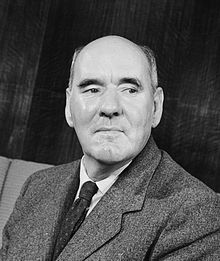C. Northcote Parkinson
Appearance

Cyril Northcote Parkinson (30 July 1909 – 9 March 1993) was a British naval historian and author of some 60 books, the most famous of which was his best-seller Parkinson's Law, which led him to be also considered as an important scholar in public administration and management.
Quotes
[edit]- It is not the business of the botanist to eradicate the weeds. Enough for him if he can tell us just how fast they grow.
- In The Economist (November 1955).
- Expenditure rises to meet income.
- The Law and the Profits (1960).
- Delay is the deadliest form of denial.
- The Law of Delay (1970).
Parkinson's Law: and Other Studies in Administration (1957)
[edit]Cyril Northcote Parkinson and Robert Osborn. Parkinson's Law, and Other Studies in Administration: And Other Studies in Administration. Houghton Mifflin, 1957.
- The time spent on any item of the agenda will be in inverse proportion to the sum involved.
- p. 24. Popularly known as Parkinson's Law of Triviality.
- Work expands so as to fill the time available for its completion... Politicians and taxpayers have assumed (with occasional phases of doubt) that a rising total in the number of civil servants must reflect a growing volume of work to be done. Cynics, in questioning this belief, have imagined that the multiplication of officials must have left some of them idle or all of them able to work for shorter hours. But this is a matter in which faith and doubt seem equally misplaced. The fact is that the number of the officials and the quantity of the work are not related to each other at all. The rise in the total of those employed is governed by Parkinson's Law and would be much the same whether the volume of the work were to increase, diminish, or even disappear. The importance of Parkinson's Law lies in the fact that it is a law of growth based upon an analysis of the factors by which that growth is controlled.
- Parkinson's Law. It is based on an article published in The Economist (November 1955).
- A perfection of planned layout is achieved only by institutions on the point of collapse.
- p. 60; cited in: Craig Calhoun (2012), Contemporary Sociological Theory, p. 254
In-laws and Outlaws, (1962)
[edit]C. Northcote Parkinson, In-laws and Outlaws, London 1962.
- The man whose life is devoted to paperwork has lost the initiative, He is dealing with things that are brought to his notice, having ceased to notice anything for himself.
- Cited in:Lionel G. Titman (1990), The Effective Office: A Handbook of Modern Office Management. p. 117
- Expansion means complexity, and complexity decay.
- Cited in: Ian Charles Jarvie (2014), Towards a Sociology of the Cinema (ILS 92). p. 34

